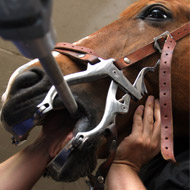
Many vets unaware of the techniques that equine dental technicians are permitted to carry out
BEVA has put together a new information leaflet explaining the regulations surrounding dental care and describing where recommended practice differs from the letter of the law.
The announcement of the leaflet follows a recent poll of BEVA members which indicated that more than half are unaware of the dentistry techniques that equine dental technicians (EDTs) are permitted to carry out and the levels of veterinary supervision required.
All treatment and diagnostic procedures in the horse's mouth are Acts of Veterinary Surgery under the Veterinary Surgeons Act 1966. The only exception is the manual removal of small dental overgrowths and sharp enamel points with hand instruments.
However, a limited number of procedures, despite being considered Acts of Veterinary Surgery, may be delegated safely to suitably qualified EDTs without compromising the welfare and safety of the horse. In 2009, the RCVS listed these processes and categorised all dental procedures into three groups:
- Category one: Procedures that are not Acts of Veterinary Surgery
- Category two: Procedures that are Acts of Veterinary Surgery but can be safely delegated to suitably qualified EDTs
- Category three: Procedures that are Acts of Veterinary Surgery and cannot be safely delegated
For their own protection, BEVA recommend that all vets who deal with horses:
- Are familiar with category one and two procedures
- Ensure they know whether or not any EDT that they are working with is qualified to carry out category two procedures
- Report to the VMD any instances of non-vets supplying oral sedatives or other prescription only drugs
Vicki Nicholls, chair of BEVA council’s Paraprofessional Committee and member of the British Association of Equine Dental Technicians, said: “The lack of awareness is alarming and clearly emphasises the need to make vets and equine dental technicians fully conscious of current regulations regarding equine dentistry. Non-adherence to the regulations is a serious matter and could lead to prosecution of the veterinary surgeon, EDT and/or owner.”
To download copies of the dental regulations information leaflet, visit www.beva.org.uk



 The latest
The latest